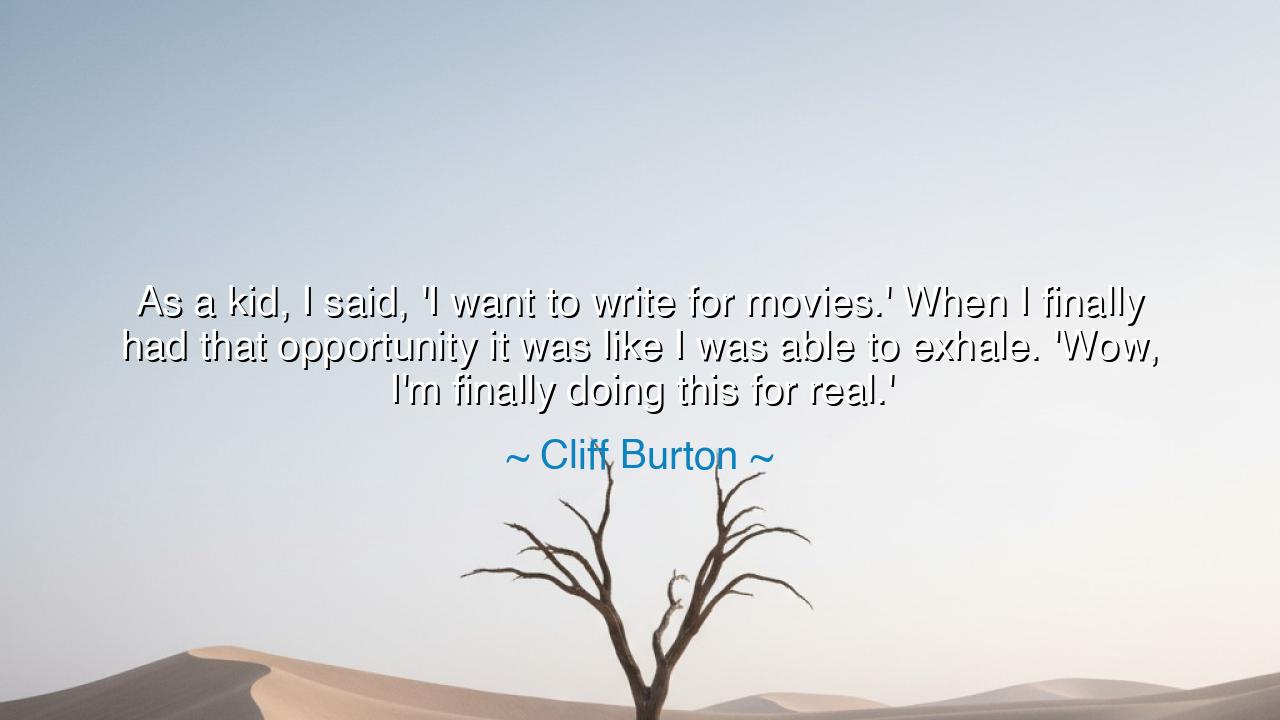
As a kid, I said, 'I want to write for movies.' When I finally
As a kid, I said, 'I want to write for movies.' When I finally had that opportunity it was like I was able to exhale. 'Wow, I'm finally doing this for real.'






In the words of Cliff Burton, spoken like a breath long held in the chest of destiny, we hear the cry of every soul that has ever dreamed: “As a kid, I said, ‘I want to write for movies.’ When I finally had that opportunity it was like I was able to exhale. ‘Wow, I’m finally doing this for real.’” This is not merely the reflection of a man upon his craft; it is the eternal sigh of fulfillment, the sacred moment when longing becomes reality, when the seed of childhood blossoms at last into the fruit of purpose.
From the beginning of time, the human heart has been filled with desires too vast for the present. The shepherd boy gazed at the stars and whispered, “I will be a king.” The child drawing lines in the dust declared, “I will paint the world.” The student of philosophy in Athens proclaimed, “I will speak truth before the people.” And so too did young Burton, filled with fire, utter his vow: to write for the great realm of movies. His words were not mere play, but the shaping of destiny, for within the innocent proclamation of youth lies the map of one’s becoming.
The meaning of Burton’s exhale is profound. It is the release of years of striving, of walking paths steep and uncertain, of holding one’s breath while chasing a dream that seemed at times impossibly far. Every true calling demands this breathlessness: a tension, a waiting, a wrestling with fate. And when the day comes, when the long pursuit becomes reality, the soul loosens its grip, and from the depths arises that sacred sigh: I am finally doing this for real.
Consider the tale of Michelangelo, the boy who once sculpted angels in the courtyards of Florence. From his youth he longed to carve life into stone, yet for many years he served apprenticeships, his genius unnoticed by the mighty. Then, when at last he stood before the block of marble that would become the David, he too must have exhaled. In that moment, his childhood vow was no longer a hope but a living work. Just as Burton exhaled when his music found its rightful home in film, Michelangelo exhaled when his chisel found its eternal mark. The sigh of arrival is the same across centuries, across all crafts, across all hearts.
Yet let us not forget: the exhale does not come without the inhale. Before fulfillment, there must be the breath of patience, discipline, and faith. Burton did not stumble into his dream by chance. He practiced, he suffered, he persevered. So too must all who dream prepare themselves. To exhale without first inhaling is impossible, for no man receives the crown who has not borne the weight of struggle. The sigh of triumph is purchased with years of silence, years of work unseen.
The wisdom here is clear: hold your dream close, guard it, and labor for it without ceasing. Do not scoff at the promises of your younger self, for they are the whispers of destiny. When the world tells you to let go, remember Burton’s voice, remember Michelangelo’s stone, remember the sigh of every soul that has finally stood where it vowed it would stand. For the exhale is not given to the faint of heart, but to those who endure.
What then should you do? First, speak your dream aloud, as Burton once did. Let the universe hear your vow. Second, work tirelessly, for opportunity comes only to those prepared to seize it. Third, be patient, for the inhale may last long years, but the exhale will come in its season. And when it comes, do not hesitate to breathe deeply, to rejoice, and to know that you are at last “doing this for real.”
Thus, let Burton’s words echo in your heart: the dream of the child is the destiny of the adult. Chase it, endure for it, and one day, with trembling breath, you too shall exhale and say: At last, I am truly living my calling.






AAdministratorAdministrator
Welcome, honored guests. Please leave a comment, we will respond soon